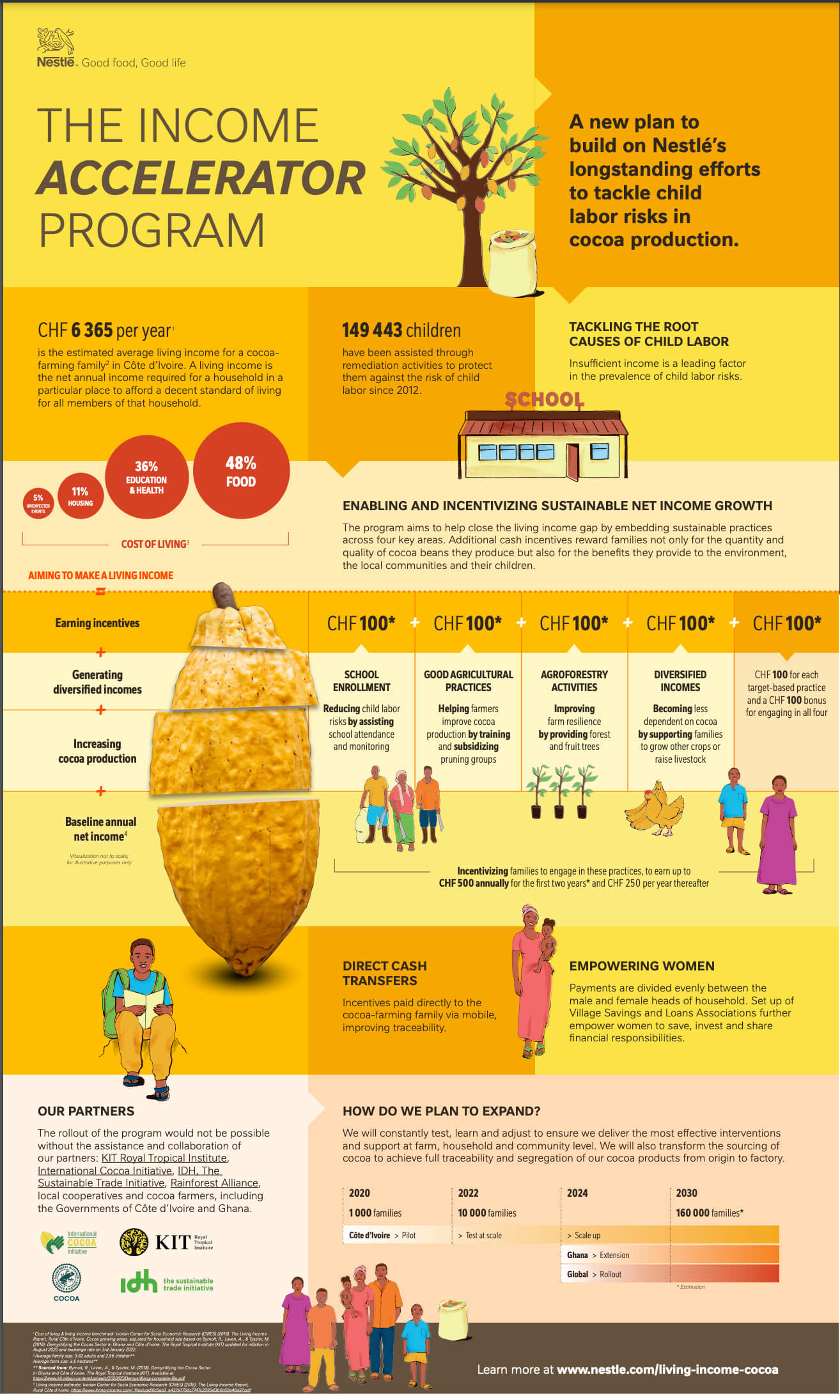Nestlé tackles child labor, farmer income & full traceability

Under its new plan, begun as a pilot program in Côte D’Ivoire in 2020, Nestlé will help combat the many issues facing cocoa-producing families including child labour, poverty and gender disparity
At the heart of the plan is an innovative income accelerator program. This will improve the livelihoods of cocoa-farming families, advance regenerative agricultural practices and work towards gender equality.
Cocoa-farming households will receive a cash incentive for activities that further these goals, including enrolling kids in school.
The new plan also helps transform Nestlé’s sourcing of cocoa to fully traceable.
Nestlé's income accelerator program offers incentives to encourage behaviors and agricultural practices designed to steadily build social and economic resilience over time, with farming families rewarded for the benefits they provide to the environment and local communities in addition to the quantity and quality of cocoa they produce.
These incentives are in addition to the premiums paid to the governments of Côte d’Ivoire and Ghana and the premiums Nestlé offers for certified cocoa. This cocoa is independently audited against the Rainforest Alliance Sustainable Agriculture Standard, promoting the social, economic and environmental well-being of farmers and local communities.
The immense social and climate challenges faced by cocoa-farming communities, including widespread poverty and limited access to basic infrastructure, contribute to the risk of child labour. With help, Nestlé's new initiative aims to address these root causes of child labor.
“Our goal is to have an additional tangible, positive impact on a growing number of cocoa-farming families, especially in areas where poverty is widespread and resources are scarce, and to help close the living income gap they face over time,” said Mark Schneider, Nestlé CEO. “Building on our longstanding efforts to source cocoa sustainably, we will continue to help children go to school, empower women, improve farming methods and facilitate financial resources. We believe that, together with governments, NGOs and others in the cocoa industry, we can help improve the lives of cocoa-farming families and give children the chance to learn and grow in the safe and healthy environment they deserve.”

Under the new program that rewards practices that increase crop productivity, families can earn up to CHF 500 (US$537) annually, in addition to cocoa sales, for the first two years of the program. This higher incentive is intended to accelerate the implementation of good practices, building future impact. After the first two years, it will level at CHF 250 (US$287) annually. These incentives are not based on quantity of cocoa produced, and therefore are available to smaller farmers as well as larger. The program also offers financial incentives for the farmer's spouse, who is typically responsible for household expenses and childcare, improving gender equality.
• School enrollment for all children in the household ages 6-16;
• Implementing good agricultural practices, such as pruning, which increase crop productivity;
• Performing agroforestry activities to increase climate resilience, like planting shade trees;
• Generating diversified incomes, for example through growing other crops, raising livestock such as chickens, beekeeping or processing other products like cassava.
Payments will be delivered via a secure mobile service transfer that will ensure traceability directly from Nestlé suppliers to the intended recipient. Because cash flow throughout the year is often a challenge, cash incentives will be distributed when they are needed most. Based on feedback from farmers, this includes the back-to-school period and before the rainy season.
A pilot program with 1,000 farmers in Côte d'Ivoire will now be expanded to include 10,000 farmers in the country before expanding into Ghana. The goal is for all cocoa-farming families in its global cocoa supply chain to be in the program by 2030.
Nestlé will help ensure farmers have the resources, training and social and financial structures to make lasting changes by:
• Enhancing the existing monitoring and remediation system to help identify, prevent and address child labor risk and increase school enrollment;
• Offering families training through the Gender Action Learning System and on household financial planning and entrepreneurship;
• Organizing and training local groups to perform pruning and other beneficial agricultural tasks within a given cooperative each year;
• Providing income diversification opportunities for farmers and their spouses;
• Helping set up Village Savings and Loans Associations (VSLA), focused on women, to encourage savings and provide loans for small business opportunities.
As part of the program, Nestlé will transform the global sourcing of cocoa to achieve full traceability and segregation of its cocoa products from origin to factory. This new effort will help transform the supply chain of Nestlé and the broader industry. Nestlé will introduce a range of products with cocoa sourced from this innovative program, offering consumers the opportunity to support the improvement of the families’ livelihoods and the protection of children. This will start with a selection of KitKat products in 2023.
“Our actions can help catalyze change on an important topic that is so close to our hearts. They will drive accountability and transparency across the industry, at a time when customers, employees and communities increasingly expect companies to deliver on their shared values," said Magdi Batato, Executive Vice President and Head of Operations. "By increasing traceability at scale, we will help build consumer trust in our products and respond to the growing demand for responsibly and sustainably sourced cocoa.”









.jpg?&resize.width=322&resize.height=483)
